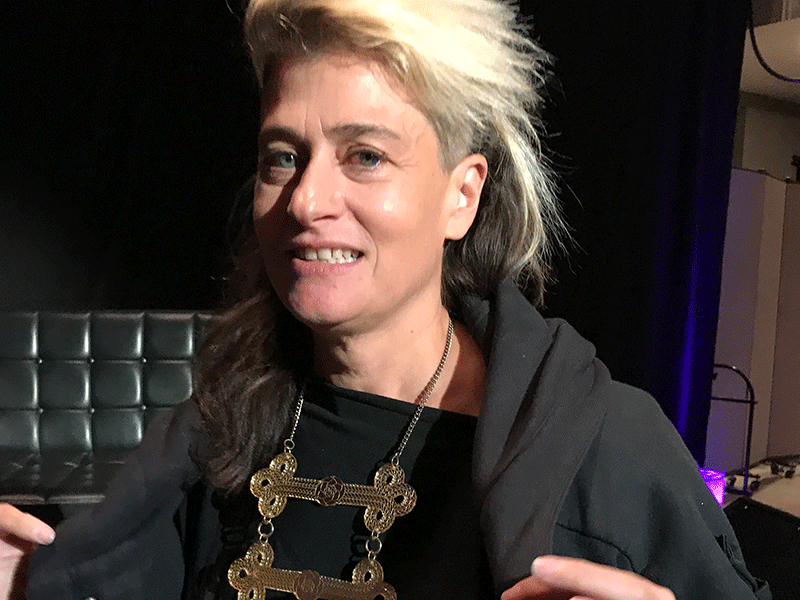It’s not too often that millennials outnumber baby boomers at an Art Gallery of Ontario (AGO) event.
But on Oct. 3, some 250 people – the majority of them under 35 – converged on the AGO to attend an evening with Peaches, the Toronto-born, internationally acclaimed Jewish electro-punk musician.
This evening was hosted by CBC radio personality, Sook-Yin Lee. She interviewed Peaches a.k.a. Merrill Nisker, through a retrospective examination of her colourful and controversial 28-year music career.
This event was part of the series, Inspiration is a Monster: Conversations with Legends of the Dark Arts, which was held in conjunction with the AGO exhibit – Guillermo del Toro: At Home with Monsters.
Nisker, a trailblazer in the electroclash genre, launched her persona, Peaches, in 2000 and has since released five albums, and numerous videos and art films.
Her sexually explicit, gender-bender music, videos, films and performance art has garnered her a large international following.
Peaches’ songs have been featured in mainstream films like Mean Girls, Lost in Translation and Jackass Number Two and television shows like 30 Rock, Ugly Betty and South Park.
She has collaborated with such pop stars as Pink, Feist, Christina Aguilera and Iggy Pop.
Her experimentation with a variety of art forms has connected her to other performers including Yoko Ono, John Malkovich and Margaret Cho.
Peaches who is based in Berlin and Los Angeles, began performing music in the late ’80s. She became a member of the acoustic trio, Mermaid Cafe in the early ’90s.
They played the Jewish summer camp circuit, and were very popular. “That’s where I got my start,” she joked. “We took the Jewish camps by storm in 1990.
“We sang about how to relate to gay feelings in the Jewish community and about Jewish camp friendships.”
She attended USDS (United Synagogue Day School, now the Robbins Hebrew Academy) in Toronto until Grade 6. And after graduating from York University in theatre arts, she taught creative music and drama at Associated Hebrew Schools and Chabad.
She said her discovery of “synthesizer”- type music, was a game changer, because this machine – it had a drum beat and instrumental options – enabled her to play and mix her own electronic music. “I could produce it myself.”
Early in her career she said she noticed that few female singers sang about their sexual desires. “People (women) were talking about sex, but not in their music.”

She said she was inspired by Toronto singer, Carole Pope of Rough Trade fame, who “unapologetically” expressed her sexual desires in her music. “When I heard her on the radio I thought, this is amazing.”
Embracing her own sexuality in music has been empowering, she said. “It’s about feeling comfortable in your own body…It’s a lifelong goal.”
Host Lee showed a scene from one of the innovative Super-8 films that accompanied Peaches’ early music. The clip was a humorous scene of Peaches and fellow Canadian singer Feist having an erotic encounter with a bicycle.
Peaches noted that this kind of film is mainstream now. “Bike porn gets shown all over the place.”
“Playful and spontaneous,” is how she described Red Leather, another one of her indie films/ videos. “Sexploration in music has enabled me to be more silly and … enjoy myself.”
READ: AN EVENING OF JAZZ IN SUPPORT OF CANCER
She said getting diagnosed with thyroid cancer and “confronting my mortality at the age of 30” led her to reinvent herself as Peaches.
The Teaches of Peaches, her second solo, but first album as Peaches, was released in 2000, the year she left for Berlin.
She said her desire for “more show and drama,” spurred her move to Europe.
She visited her lon-time friend and music collaborator, Chilly Gonzales (aka Jason Beck), who was getting established in Berlin.
After a one-night gig at a night club, she was signed by the Berlin-based Kitty-Yo label.
Lee also showed one of Peaches’ many videos that blur gender identity, a common theme in her work. Lee pointed out that Peaches was exploring transgenderism before transgender issues became a mainstream focus.
And while she has created an extensive body of work in film and video, Peaches said live performance is still very rewarding. “There’s a wish for communion with the audience…
“There’s that rock and roll feeling…that feeling is community and that’s why you play live shows.










